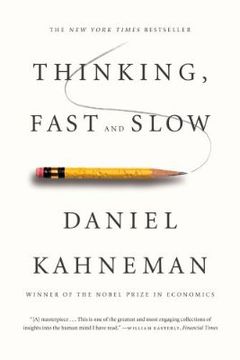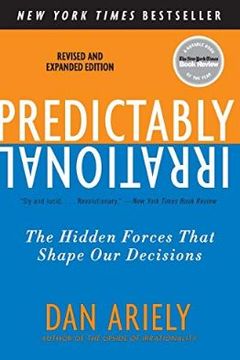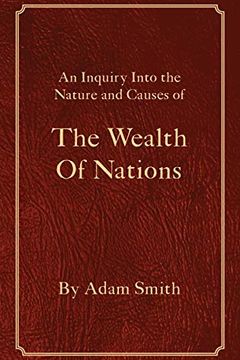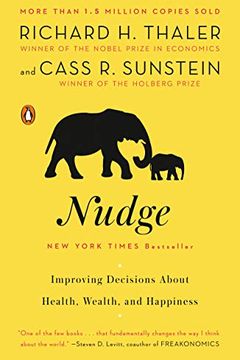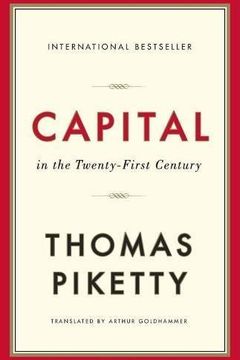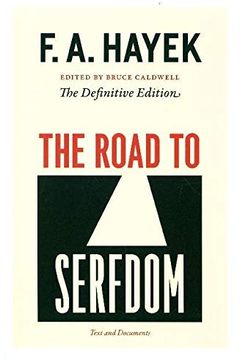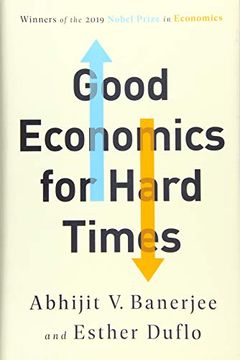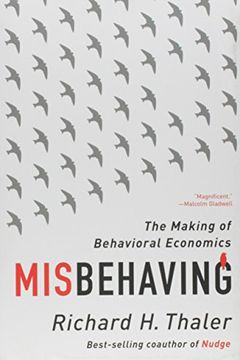Best Economics Books
Whether you're a student or a seasoned economist, these are the must-read books on economics that come highly recommended from various financial and educational publications.

100 books on the list
Sort by
Number of Articles
Layout
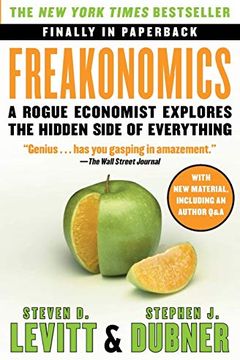
Freakonomics
A Rogue Economist Explores the Hidden Side of Everything (P.S.)
Discover the unconventional world of economics with this groundbreaking book that challenges conventional wisdom. Steven D. Levitt and Stephen J. Dubner's "Freakonomics" explores the mysteries of everyday life, from the commonalities between schoolteachers and sumo wrestlers to the secrets of the Ku Klux Klan, revealing how economics is the study of incentives and how people get what they want or need. Featuring insightful storytelling and a fresh perspective, this New York Times bestseller is a must-read for anyone seeking to understand the hidden connections in our world.
Featured in 19 articles
Explore the inner workings of the mind in this groundbreaking book that explains the two systems that drive the way we think. System 1 is fast, emotional, and intuitive while System 2 is slower, more analytical, and logical. Discover the benefits and drawbacks of both systems and learn how to tap into the benefits of slow thinking. With practical insights into decision-making in both our personal and professional lives, this book is a must-read for anyone looking to guard against mental pitfalls and gain a deeper understanding of the way we think.
Featured in 15 articles
Discover why we make seemingly irrational decisions in our lives, from overspending on a meal to buying a car, in this groundbreaking and expanded edition of a New York Times bestseller. Author Dan Ariely challenges the assumption that we behave in rational ways and reveals the systematic and predictable nature of our misguided behaviors. Explore fascinating insights into the biases and tendencies that make us predictably irrational in this compelling read.
Featured in 11 articles
This classic of economics explores the origins of national wealth, covering topics from the division of labor to free markets. Written in the midst of the Industrial Revolution, this book provides timeless insight into the building blocks of economic prosperity.
Featured in 10 articles
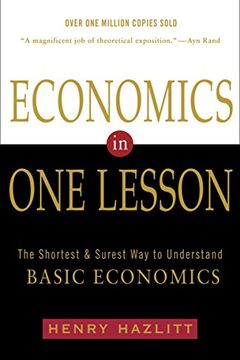
Economics in One Lesson
The Shortest and Surest Way to Understand Basic Economics
Explore the teachings of Henry Hazlitt, a founding vice-president of the Foundation for Economic Education, in his seminal work, Economics in One Lesson. A classic economic primer and a fundamental influence on modern "libertarian" economics, Hazlitt's perspective on free markets, economic liberty, and the dangers of government intervention remains relevant even after more than 50 years since its initial publication. With concise and instructive insights, Hazlitt's efforts to dissemble economic fallacies have been credited with foreseeing the collapse of the global economy. Discover the timeless wisdom of Hazlitt's anti-deficit stance, committed to non-governmental solutions.
Featured in 10 articles
Discover how every choice we make is influenced by biases and learn how to nudge yourself towards better decision-making. Nobel Prize-winning economist Richard H. Thaler and Harvard Law professor Cass R. Sunstein provide eye-opening examples and decades of research to show that our choices are never neutral. Using "choice architecture," we can nudge ourselves and others towards decisions that benefit our families, society, and planet without limiting our freedom of choice. A must-read for anyone looking to enhance their decision-making skills.
Featured in 9 articles
This groundbreaking book takes a deep dive into economic history, analyzing the rising inequality of the past two centuries. Winner of multiple book awards and hailed by critics as an intellectual tour de force, it aims to revolutionize the way we think about wealth and its distribution. With sweeping insight and thorough research, the author presents an important study of inequality that cannot be ignored.
Featured in 9 articles
This classic work in political philosophy, intellectual and cultural history, and economics explores the dangers of state control over the means of production. Originally published in 1944, The Road to Serfdom inspired and infuriated politicians and intellectuals. For author F. A. Hayek, empowering the government with increasing economic control would lead not to utopia but to the horrors of Nazi Germany and Fascist Italy. A perennial bestseller, the book has sold 400,000 copies in the US and has been translated into over twenty languages. This new edition includes a foreword, standardization of references, and helpful explanatory notes.
Featured in 9 articles
Recommended by
Margaret ThatcherDiscover how economics can solve the toughest social and political problems of our time with this ambitious and thought-provoking read. Prize-winning economists Abhijit V. Banerjee and Esther Duflo challenge traditional western-centric thinking and offer insights on key issues such as migration, trade, growth, polarization, and welfare. With a precise and accessible approach, they candidly explore the complexities and uncertainties of economic theory, proving that Good Economics can be done right.
Featured in 6 articles
Recommended by
Bill GatesExplore the radical notion that real-life humans, with all our biases and irrational tendencies, are the central agents in the economy. In Misbehaving, Nobel laureate Richard H. Thaler shares his hilarious and inspiring journey to bring economics back down to earth, revealing how our misbehavior has serious consequences. Discover how behavioral economics opens up new ways to look at everything from household finance to assigning faculty offices, all while providing entertaining stories of Thaler's spirited battles with traditional economic thinking.
Featured in 6 articles
The Big Short by Michael Lewis
Why Nations Fail by Daron Acemoglu
Lords of Finance by Liaquat Ahamed
Irrational Exuberance by Robert J. Shiller
The Myth of the Rational Market by Justin Fox
Factfulness by Hans Rosling
The Intelligent Investor by Benjamin Graham
Poor Economics by Abhijit Banerjee
Antifragile by Nassim Nicholas Taleb
Human Action by Ludwig von Mises
Fooled by Randomness by Nassim Nicholas Taleb
The Great Transformation by Karl Polanyi
Guns, Germs, and Steel by Jared Diamond
Capital by Karl Marx
Other People's Money by John Kay
Capitalism and Freedom by Milton Friedman
Thinking Strategically by Avinash K. Dixit
The General Theory of Employment, Interest, and Money by John Maynard Keynes
The Undercover Economist by Tim Harford
GDP by Diane Coyle
The Armchair Economist by Steven E. Landsburg
Basic Economics by Thomas Sowell
Americana by Bhu Srinivasan
This Changes Everything by Naomi Klein
Capitalism in America by Alan Greenspan
Influence by Robert B. Cialdini
Debt by David Graeber
Doughnut Economics by Kate Raworth
Crashed by Adam Tooze
Flash Boys by Michael Lewis
A Splendid Exchange by William J. Bernstein
The Black Swan by Nassim Nicholas Taleb
Moneyball by Michael Lewis
Naked Economics by Charles Wheelan
Between Debt and the Devil by Adair Turner
The Paradox of Choice by Barry Schwartz
The Changing World Order by Ray Dalio
The Rational Optimist by Matt Ridley
More Money Than God by Sebastian Mallaby
Superforecasting by Philip E. Tetlock
Technological Revolutions and Financial Capital by Carlota Perez
Too Big to Fail by Andrew Ross Sorkin
Economic Facts and Fallacies by Thomas Sowell
Small Is Beautiful by E. F. Schumacher
The Republic of Beliefs by Kaushik Basu
The Rise and Fall of Nations by Ruchir Sharma
Against the Gods by Peter L. Bernstein
Red Plenty by Francis Spufford
Individualism and Economic Order by F. A. Hayek
Information Rules by Carl Shapiro
Economics by Paul Samuelson
Makers and Takers by Rana Foroohar
The Upside of Irrationality by Dan Ariely
The End of Alchemy by Mervyn King
The Tipping Point by Malcolm Gladwell
Economics Rules by Dani Rodrik
The Signal and the Noise by Nate Silver
Hall of Mirrors by Barry Eichengreen
The Everything Economics Book by David A Mayer
The Green and the Black by Gary Sernovitz
The Theory of the Leisure Class by Thorstein Veblen
Hidden Order by David D. Friedman
Lean In by Sheryl Sandberg
Blink by Malcolm Gladwell
Think Twice by Michael J. Mauboussin
Stumbling on Happiness by Daniel Gilbert
Postcapitalism by Paul Mason
The Economic Government of the World by Martin Daunton
The Crisis of Democratic Capitalism by Martin Wolf
The Psychology of Money by Morgan Housel
Power and Progress by Unknown Author
The Law by Frédéric Bastiat
Give and Take by Adam Grant
The Rise and Fall of American Growth by Robert J. Gordon
The Worldly Philosophers by Robert L. Heilbroner
The Shock Doctrine by Naomi Klein
Elon Musk by Ashlee Vance
Development as Freedom by Amartya Sen
The Triumph of Injustice by Emmanuel Saez
Markets, State, and People by Diane Coyle
Common Sense Economics by James D. Gwartney, Richard L. Stroup, Dwight R. Lee, Tawni Hunt Ferrarini
What Would the Great Economists Do? by Linda Yueh
A Random Walk Down Wall Street by Burton G. Malkiel
Chip War by Chris Miller
Scarcity by Sendhil Mullainathan
The Great Convergence by Richard Baldwin
Capitalism, Socialism and Democracy by Joseph A. Schumpeter
The Euro by Joseph E. Stiglitz
Animal Spirits by George A. Akerlof
An Edible History of Humanity by Tom Standage
